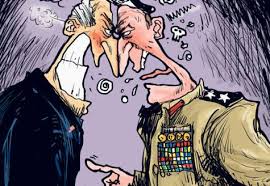Widgetized Section
Go to Admin » Appearance » Widgets » and move Gabfire Widget: Social into that MastheadOverlay zone
A Few Words on Civilian-Military Relations
The views expressed are those of the author and do not necessarily reflect the views of ASPA as an organization.
By A. Hannibal Leach
May 17, 2016

Relations between the military and lawmakers have been lukewarm at best for quite some time. In recent years, tensions have especially erupted between the military’s officer corps, and the U.S. Senate. Senators often accuse military officers of inefficiency, citing major management failures such as the Walter Reed scandal and complaints regarding former SOCAFRICA Commander (Special Operations Commander, Africa) Rear Adm. Brian Losey.
On the other hand, military officers take umbrage with lawmakers in what they see as their infringement on military matters, their propensity to take expedient positions on military issues often at the expense of the military and with putting national security issues at risk for the sake of their political careers. Thus, from the outside, civil-military relations in this domain, are unfortunately not as well as citizens would prefer.
Although recent media accounts seem to portray this unique relationship as all but disintegrated, upon closer inspection, matters are not nearly as bad. Theoretically, our democratic style of governance not only calls for effective cooperation between the military’s top brass and lawmakers, but this relationship is also structured so as to provide each side with meaningful checks upon the other (checks, but not necessarily balances). In our tradition, civilians control the military, but do so in a way so as not to extravagantly infringe on military affairs. Such infringement may lead to unnecessary loss of life, losses on the battlefield and even popular backlash. The military on the other hand submits to civilian control in order to give it the credibility necessary to carry-out what its objectives call for (force, occupation, etc.). Military involvement in politics is permitted in a limited fashion, but is generally frowned on by both civilians and military professionals.
As our nation has evolved, and the idea of a standing military has become a permanent fixture, our thoughts about civil-military relations must also undergo some change. The military is a profession with various associations and groups that exist to further the interests of service members and military installations. Perhaps unheard of in earlier periods, military members speak out on all sorts of topics such as to protect the closing of a military base, to object to being passed-over for a promotion, to report waste and abuse, etc. The 2012 Whistleblower Protection Enhancement Act, partly contributes to these actions. But on the whole, transitioning the military to a permanent profession greatly accounts for this new dynamic in military conduct.
The tone that civil-military relations ultimately adopts depends to a large extent on the type of leadership being provided. Leadership begins at the top however, and in this nation, leadership must be filled by the president. Under our Constitution, the president serves as the nation’s head of state, as the government’s chief executive officer, as well as commander in chief. Thus, the president must find ways to maximize the contending merits and interests of different elements within the state.
Presidential styles of leadership have varied throughout the years and civil-military relations subsequently fluctuated between hot and cold. The Clinton administration put great faith in the military establishment and allowed top military figures to exercise great influence. The George W. Bush administration ran a tight ship similar to that of Nixon and Kissinger, where military affairs seemed to be primarily micro-managed from the White House. George W. Bush, Dick Cheney and other civilian authorities throughout his tenure, worked tirelessly to implement policies without being unduly burdened by a sluggish bureaucracy, and they firmly reasserted civilian control over the military.
To date, President Barack Obama’s stewardship over civilian and military affairs resembles that of John F. Kennedy’s. Reminiscent of Kennedy, Obama’s style has been to allow great input from his senior military staff, but ultimately exercising judgment as he sees it, from his unique perspective as the nation’s final decision-maker. During his tenure in office, President Barack Obama provided exceptional leadership in many instances where civil-military relations were highly salient and often vitriolic. For instance, after unruly remarks about the president made by General Stanley McChrystal were revealed, President Obama did not exacerbate the situation by issuing his displeasure with the esteemed general. Rather, Obama displayed the courtesy and respect due to the general by recalling him back to Washington and relieving him of his duty in a manner consistent with military decorum.
In closing, it is important to understand that although the mood of civil-military relations begins at the top, those in other areas of the relationship also play a significant role in ensuring this special association operates smoothly. Though they should seek to refrain from political involvement, senior and junior military officers, as well as enlisted personnel, must understand the political system in which they operate. This will help to ensure that they know their bounds and how to properly operate within the less clearly defined penumbras existing between different spheres of government. On the other side, civilian authorities should become more versed in military affairs in order to better understand the needs of the military, as well as to recognize their missteps.
Author: A. Hannibal Leach, MA, MPA was previously employed as a congressional aide in the office of former Congressman Bart Gordon. He is the current president of the Center for Strategic Affairs and Public Diplomacy, a think tank that provides management consulting services. His scholarly research focuses on American politics, political institutions, as well as Congress and its relationship to the conduct and formation of U.S. foreign policy. Contact: On .


 (2 votes, average: 4.50 out of 5)
(2 votes, average: 4.50 out of 5)
Follow Us!